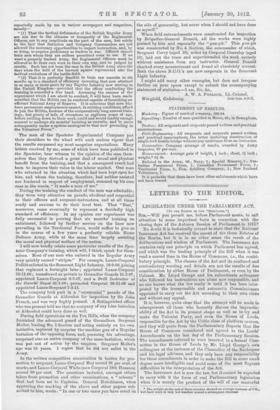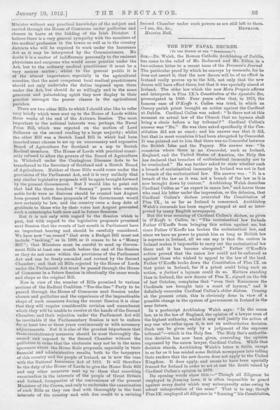LETTERS TO THE EDITOR.
LEGISLATION UNDER THE PARLIAMENT ACT, [To ens EDITOR or 71Is "8FECTATOR.1 you permit me, before Parliament meets, to call attention to some important facts in connexion with the closing days of the Autumn Session of Parliament in 191114 No doubt it is technically correct to state that the National Insurance Act has received the assent of the three Estates of the Realm, but it is in no other sense the result of the deliberations and wisdom of Parliament. The Insurance Act contains only one principle on which Parliament has agreed, and which was the leading principle of the Bill when it was read a second time in the House of Commons, i.e., the contri- butory principle. The clauses of the Act and its confused and contradictory wording and details are not the results of due consideration by either House of Parliament, or even by the Cabinet. Mr. Lloyd George and his subordinate colleagues who followed his instructions are alone now responsible, and no one knows what the law really is until it has been inter- preted by the irresponsible and autocratic Commissioners appointed to carry out the Act according to their own views and without any appeal.
It is, however, quite clear that the attempt will be made to
misrepresent all those who honestly discuss the impractic- ability of the Act in its present shape as well as to try and make the Unionist Party, and even the House of Lords, responsible for the Act by the Uritie class of platform orators, and they will quote from the Parliamentary Reports that the House of Commons considered and agreed to the Lords' Amendments on the last day of the Parliamentary Session. The amendments referred to were inserted in a formal Com- mittee in the House of Lords by Mr. Lloyd George's own colleagues at the instance of the Chancellor of the Exchequer and his legal advisers, and they only have any responsibility for these amendments in order to make the Bill in some small degree more intelligible and avoid some of the most flagrant difficulties in the interpretation of the Act.
The Insurance Act is now the law, but it cannot be expected to carry with it the force of real Parliamentary legislation when it is merely the product of the will of one masterful * The weight at the end of three months showed an average increase of 8 lb., but hard work in very hot weather caused a subsequent deoreaso
Minister without any practical knowledge of the subject and carried through the House of Commons under guillotine and closure in haste at the bidding of the Irish Dictator. I believe there is a very general sympathy with the members of the medical profession in the towns as well as in the country districts who will be required to work under the Insurance Act as it may be interpreted by the Commissioners. No doubt it is a matter of indifference personally to the eminent physicians and surgeons who would never practise under the Act, but to the ordinary medical practitioner it must be a very serious matter ; whilst to the general public it is of the utmost importance, especially in the agricultural counties, that the most competent local medical practitioners should not only undertake the duties imposed upon them under the Act, but should do so willingly and in the same generous and painstaking spirit they now display in their practice amongst the poorer classes in the agricultural parishes.
There are two other Bills to which I should also like to refer very briefly which were sent up to the House of Lords within three weeks of the end of the Autumn Session. The most important to the national interests was, perhaps, the Naval Prize Bill, which was rejected on the motion of Lord Selborne on the second reading by a large majority; whilst the other Bill was a Scotch Land Bill in which had been inserted some clauses to set up an unnecessary and expensive Board of Agriculture for Scotland as a sop to Scotch Radical members. The House of Lords with practical unani- mity refused to allow the powers of the Board of Agriculture in Whitehall under the Contagious Diseases Acts to be transferred to the Secretary of Scotland and a Scotch Board of Agriculture. Neither of these Bills would come under the provisions of the Parliament Act, and it is very unlikely that any similar legislative proposals will be again brought forward by the present Government. But I would like to point out that had the three hundred " dummy" peers who certain noble lords were so desirous should be created last August been present both these proposals of the Government would now certainly be law, and the country owes a deep debt of gratitude to those who by their votes last August prevented such a catastrophe both now and in future Sessions.
But it is not only with regard to the Session which is past, but with regard to the legislative proposals promised next Session that the events of last month in Parliament have an important bearing and should be carefully considered. We have now "on record" that even a Budget Bill must not include "tacking," as in 1909, or it ceases to be a "Money Bill" ; that Ministers must be careful to send up Govern- ment Bills at least one month before the end of the Session or they do not come within the provisions of the Parliament Act and can be freely amended and revised by the Second Chamber ; and that all Bills rejected by the House of Lords under the Parliament Act must be passed through the House of Commons in a future Session in identically the same words and shape as the original Bill.
Now in view of the number of Bills promised to various sections of the Radical Coalition " Toe-the-line " Party to be passed through the House of Commons next Session under closure and guillotine and the experience of the impracticable shape of such measures during the recent Session it is clear that they will require considerable revision and amendment which they will be unable to receive at the hands of the Second Chamber, and their rejection under the Parliament Act will be inevitable if the Parliamentary Session is not to endure for at least two or three years continuously or with necessary adjournments. But it is also of the greatest importance that these revolutionary measures should be most thoroughly dis- cussed and exposed in the Second Chamber without the guillotine in order that the electorate may not bo in the same ignorance about the Home Rule proposals, especially in their financial and administrative results, both to the taxpayers of this country and the people of Ireland, as is now the case with the National Insurance Act of 1911. It will therefore be the duty of the House of Lords to give the Home Rule Bill and any other measures sent up to them that searching examination in the interests of the people of Great Britain and Ireland, irrespective of the convenience of the present Ministers of the Crown, and only to undertake the examination of such Bills as they can deal with thoroughly in the best interests of the country and with due credit to a revising Second Chamber under such powers as are still left to them.











































 Previous page
Previous page